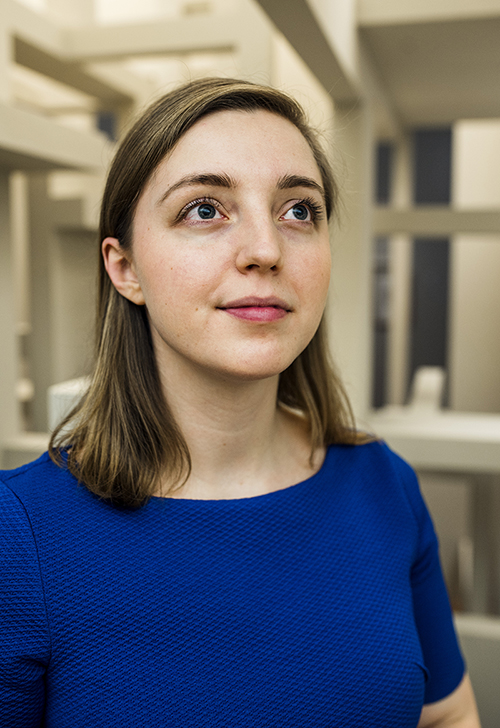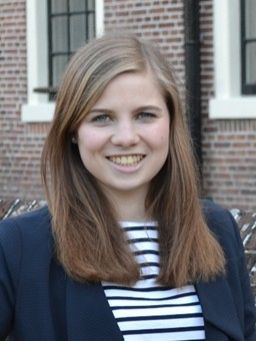Interview with alumna Charlotte Rixten, the youngest museum director in the Netherlands

Since January this year, Charlotte is the youngest museum director in the Netherlands. She is in charge of Villa Mondriaan, a museum in Winterswijk, Gelderland dedicated to Piet Mondriaan's (1872-1944) early work. Charlotte has two bachelor's degrees from the University of Groningen, one in Art and Architectural History (class of 2017) and the other in International Relations and Affairs (class of 2015). She recently obtained a master's degree in Collections and Curating Practices from the University of Edinburgh. Charlotte is an advocate for online open access to museum collections and exhibitions.
What is your favourite place in Groningen?
'I’m born and raised in Groningen, so it’s hard to pick just one place. The one that has always been my favorite though, is the nature park near Kardinge, that used to have Scottisch Highland Cows and a goat farm where you could bottle-feed the baby goats and in the summer build huts on the field.'
How do you start your day?
'A check in with everyone else in the museum, I’m often away for meetings and don’t work on weekends, so usually there’s something to catch up on.'
What is the best piece of advice you have ever received?
'The Achterhoek motto: Vaok bu’je te bang (EN: Often you’re too afraid). It’s an understated and calm version of taking risks. Not a brash and loud type of action, but just go for it, see how it works out.'
What is the greatest challenge of your job?
'As a museum director, you’re responsible for everything, which means you also have to keep a check on everything without becoming a micro manager or burned out. Especially at a museum where you’re working with a lot of different parties, such as sponsors, visitors and volunteers, it can be hard to give everything and everyone the attention they deserve.'
What do you do to relax?
'Winterswijk is a recognized national landscape right on the border with Germany and a massive tourist destination. It only takes me five minutes to get from work or my house to be in the middle of nature. Going to the Zwillbrock to watch the flamingo’s and other birds fly around after a long day in the office is the best way to relax.'
What is your most nostalgic memory of Groningen?
'I spent my entire childhood here. I have so many memories. But Noorderzon and Eurosonic/Noorderslag have been my favorite days of the year since I was about 16 and it only got better and more diverse during my university days. The whole city has a different vibe during these festivals.'
What did you want to be when you were a child?
'It went from astronomer to neurosurgeon to secretary general of the UN. Somehow museum director was never on the list.'
What is a piece of advice you would give to those thinking of applying to the University of Groningen?
In Groningen, you’re in a big city with close connections. Make use of that. Your degree programme is just the start. Don’t take this negatively, or that you need to tick off certain boxes on a list to become successful, but see it as an opportunity to go any direction that interests you, and perhaps change directions when it feels right.'
What are three things you need to do your job?
'I need to make decisions, take responsibility, and set my own limits.'
Describe the University of Groningen in one word.
'Connected.'
Who is your favorite artist and why?
'It’s a cliché to say Piet Mondriaan now that I work at the museum dedicated to his early work. However, what I have always admired in Mondriaan is how he not only had a strong vision about the role of art in society and art itself, but also how he held himself as an artist. Mondriaan did not end up where he was because of his raw talent, but because he worked hard to achieve it. He was always where the action was and made it a point to meet other artists and creatives. At the same time he stood up for his ideas, even when only contemporary museums were interested in buying that kind of work. He worked hard for his vision and was very aware of his position in the bigger picture.'
How did the UG prepare you for your career?
'I think the role of any university is first and foremost to provide you with a theoretical basis. It is a nice bonus that the University now offers practical skills as well.'
What was most impactful for you: the coursework, internships, student clubs?
'It’s hard to say, because I think they all amplify each other and provide context for each other.'
If you were hiring new graduates from the UG, what qualifications, experiences, and/or internships would you look for?
'Every half year I hire two new students for our junior-director position. What I look for most is vision. What are your ideas for the museum, as well as your own career? How do you see those intertwining so that your time here is mutually beneficial? For me, it’s not about the experience you have, but the experience you are going to gain in the six months to a year you will spend working with us. Together with your fellow junior-director you form the daily management of the museum, so you better be ready to jump right into the action.'
What keeps you in contact with your Alma Mater now?
'In my heart Groningen will always be my hometown, and a big part of that is the University. I worked at the University Museum during my student years and that hopefully will always be a warm place to come back to.'
If you were our Rector/President for a day, what would you do? Why?
'The main change I would like to see in university culture in general is to give back freedom to students to either do more than the set curriculum or to fall flat on their faces if they do too little. I’d like to see a university that offers you a map with suggested routes, rather than a guide that takes you and a group by the hand. Sure you can get lost, but I think it’s good you have that opportunity. If you don’t learn how to fall when you fail and get back up again now, when will you?'

About the author

/alumni/about-alumni/ambassadors/2019-2020/franziska-heinzmann_-germany-%28china%29

